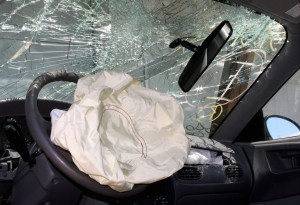With more than 33 million vehicles already subject to recall and mounting calls to recall millions more due to faulty Takata airbags, there is growing concern about getting replacements for defective airbag inflators.
That has prompted Toyota to turn to an alternative supplier for as many as 13 million of the explosive devices, according to a report by the Reuters news service which described it as “the most proactive yet” to ensure it can make necessary repairs.
Takata airbag inflators have been linked to at least eight deaths and over 100 injuries in older vehicles produced by at least 11 manufacturers, including Toyota, Honda, General Motors and BMW. The explosive squibs are used to inflate an airbag when triggered by a crash, but some used in older vehicles have been over-inflating, sending plastic and metal shrapnel into the passenger compartment.
The number of vehicles covered by recall – all at least five years old – has been rapidly increasing in recent months as more manufacturers have announced broader service actions.
(Hidden killers? What happens when airbags age? Click Here for exclusive report.)
The recalls initially focused just on driver-side airbags, and primarily on those in vehicles used in high-humidity regions, such as Florida and Puerto Rico. But under pressure from the National Highway Traffic Safety Administration, Takata recently agreed to cover those in use elsewhere in the country while also targeting passenger-side bags.
And the crisis could grew even bigger. Two U.S. Senators, Connecticut’s Richard Blumenthal and Massachusetts Edward Markey, both Democrats, yesterday called for the recall of all vehicles using Takata airbags, including newer models. They were responding to news that Volkswagen had reported to NHTSA a June 5th incident in which a side-impact airbag improperly inflated when a VW Tiguan crashed into a deer.
“This directly undercuts Takata’s continued insistence — despite growing evidence to the contrary — that the flaws in its air bag inflators are limited to prior designs in older model cars and only present when the air bags have prolonged exposure to extremely humid conditions,” the two senators said.
(Senators want millions more cars with Takata airbags recalled. Click Here for the latest development.)
It is unclear what such a move would entail were NHTSA regulators to echo the call for a broader recall and Takata to then agree to participate. It would add as many as 50 million more vehicles to the list, according to several reports.
Takata already has had trouble supplying enough replacement inflators to cover the current list of recalls, never mind handle a significant expansion.
Several manufacturers have already taken steps to find alternate sources for replacement inflators, including Honda which has turned to supplier Daicel. The move by Toyota would cover a significant expansion of the Takata recall, with supplier Nippon Kayaku Co. asked to provide up to 13 million of the devices starting next July and running through 2020, according to the Reuters report. The deal, the news service estimated, could be worth as much as $150 million.
The Japanese automaker was fined repeatedly by NHTSA for mishandling a series of issues, including so-called unintended acceleration, at the beginning of the decade. It later paid more than $1 billion to settle an investigation by the U.S. Department of Justice, also agreeing to enhance its safety efforts – something reflected by the proactive contract with Nippon Kayaku.
Toyota apparently isn’t severing its ties with Takata, however. A source telling Reuters the makers, “won’t do anything to crush” the embattled supplier.
(Hard hit by Takata recalls, Honda nonetheless posts a jump in earnings. Click Here for more.)


Most smart auto makers would use an airbag supplier other than Takata at the moment.